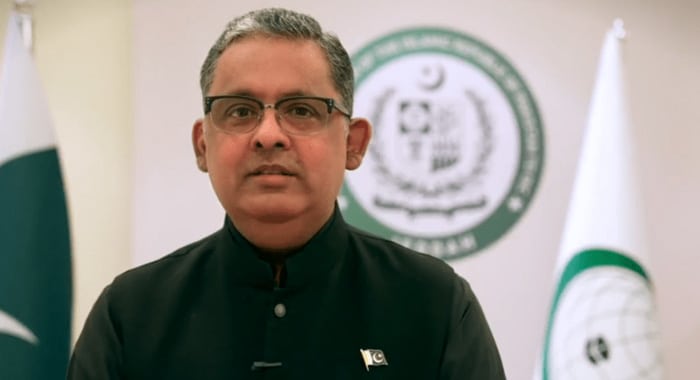Pakistan’s Ambassador to the United States, Rizwan Saeed Sheikh, has said that Washington, along with other global powers, now desires a comprehensive and result-oriented dialogue between Pakistan and India on all outstanding disputes — including the core issue of Jammu and Kashmir.
In an interview on Dawn News’ current affairs programme In Focus, Ambassador Sheikh revealed that the United States had provided firm assurances at the time of the latest ceasefire agreement between Pakistan and India that all contentious matters would be brought to the negotiating table. “The U.S. role during the ceasefire was both visible and constructive,” he said, adding that President Donald Trump had personally committed to fostering peace in the region.
Commenting on India’s recent move to display a map of “Akhand Bharat” in its Parliament, Ambassador Sheikh said it was emblematic of an expansionist and hegemonic ideology. “Such acts reflect a deeply troubling and aggressive mindset that threatens regional stability. The Hindutva-inspired rhetoric from India’s leadership borders on extremist fanaticism,” he noted.
In separate interactions with media outlets, the Pakistani envoy strongly condemned Indian involvement in destabilising Balochistan. “India’s role in fomenting unrest in Balochistan is an open secret. The terrorists and their ideological and financial sponsors — who have the blood of innocent children on their hands — are a vile stain on the conscience of humanity,” he declared.
Highlighting the U.S. efforts in diffusing tensions in South Asia, Ambassador Sheikh noted that President Trump’s personal announcement of the ceasefire demonstrated Washington’s commitment to preventing conflict between the two nuclear-armed neighbours. “The American leadership’s contribution to easing Pakistan-India tensions is praiseworthy and indicative of a genuine desire for lasting peace,” he said.
He further welcomed U.S. engagement in efforts to resolve the Kashmir dispute, terming it a critical step toward regional stability. “President Trump has consistently advocated for peace. We value his initiatives aimed at resolving the Kashmir issue, and we hope that these efforts will continue until a peaceful settlement is reached through a mutually agreed framework.”
Ambassador Sheikh reaffirmed Pakistan’s principled stance that the Kashmir dispute must be resolved in accordance with United Nations Security Council resolutions and the democratic aspirations of the Kashmiri people.
Criticising India’s conduct on the Indus Waters Treaty, he said New Delhi’s posture reflected a dangerous disregard for international law. “There is no provision within the treaty that permits unilateral suspension or withdrawal. India’s threats to disrupt water flows are not only illegal but constitute a direct provocation,” he asserted.
He cautioned that any attempt to use water as a weapon would be tantamount to a declaration of war. “Blocking water for a population of 250 million is an act of hostility. The international community cannot — and will not — endorse such inhumane and unlawful behaviour,” he warned.
Ambassador Sheikh also took aim at Indian leaders for fuelling tensions through incendiary statements. “The propagation of the Akhand Bharat narrative, and the weaponisation of nationalism for electoral gain, are deeply reckless. The Indian leadership’s insistence on playing the Pakistan card to distract from domestic failures is a perilous path,” he said.
He concluded with a firm denunciation of hate-driven politics. “The narrative of hate, which is being cultivated to cover up political shortcomings, is a grave threat to peace. The terrorists involved in Balochistan, and those shielding them under ideological or financial pretexts, represent the darkest face of humanity,” the Ambassador said.





